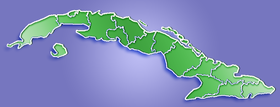- Colón, Cuba
-
This article is about the city in Cuba. For other uses, see Colón.
Colón — Municipality — Location of Colón in Cuba Coordinates: 22°43′21″N 80°54′24″W / 22.7225°N 80.90667°WCoordinates: 22°43′21″N 80°54′24″W / 22.7225°N 80.90667°W Country  Cuba
CubaProvince Matanzas Founded 1846[1] Established 1859 (Villa) Area[2] – Total 597 km2 (230.5 sq mi) Elevation 60 m (197 ft) Population (2004)[3] – Total 71,579 – Density 119.9/km2 (310.5/sq mi) Time zone EST (UTC-5) Area code(s) +53-52 Colón is a municipality and city in the Matanzas Province of Cuba.
Contents
Geography
The municipality is divided into the campos of Agüica, Este, Guareiras, Jacán, Laguna Grande, Oeste and Palmillas.[1]
History
The town was founded in 1846[1] under the name Nueva Bermeja. In 1851 the railroad reaches the town. In 1859, it achieves the status of villa (town) with the name Colón. The founder's name is don Martín José Zozaya, who founded the town in the former hacienda named La Bermeja. The deed to establish this town was signed in the city of Matanzas in 1836. At the time, don Martín set apart land for a cemetery and a church. The original name of the town was La Nueva Bermeja. The railroad had arrived near the new town in 1843 but did not cross the town until 1851. In 1852, Fernando Diago, the owner of the sugar-mill Ponina, inaugurates the first public school in town.
Economy
Colón's economy is centered around agriculture (sugarcane, tobacco, citrus fruit, honey) and stock raising. It is also an important railway center.
Demographics
In 2004, the municipality of Colón had a population of 71,579.[3] With a total area of 597 km2 (231 sq mi),[2] it has a population density of 119.9 /km2 (311 /sq mi).
See also
References
- ^ a b c Guije.com. "Colón". http://www.guije.com/pueblo/municipios/mcolon/index.htm. Retrieved 2007-10-07. (Spanish)
- ^ a b Statoids (July 2003). "Municipios of Cuba". http://www.statoids.com/ycu.html. Retrieved 2007-10-07.
- ^ a b Atenas.cu (2004). "2004 Population trends, by Province and Municipality". Archived from the original on 2007-09-27. http://web.archive.org/web/20070927111826/http://www.atenas.inf.cu/todo/Estadisticas/TABLA+No_3balance.htm. Retrieved 2007-10-07. (Spanish)
Colón: en el 150 aniversario de su fundación, published in Cuba in 1986.
External links
- Municipality webpage (Spanish)

Cárdenas Martí 
Perico 
Los Arabos  Colón
Colón 

Jagüey Grande Calimete Rodas Municipalities in Matanzas Province Calimete · Cárdenas · Ciénaga de Zapata · Colón · Jagüey Grande · Jovellanos · Limonar · Los Arabos · Martí · Matanzas · Pedro Betancourt · Perico · Unión de Reyes · Varadero Categories:
Categories:- Populated places in Cuba
Wikimedia Foundation. 2010.

